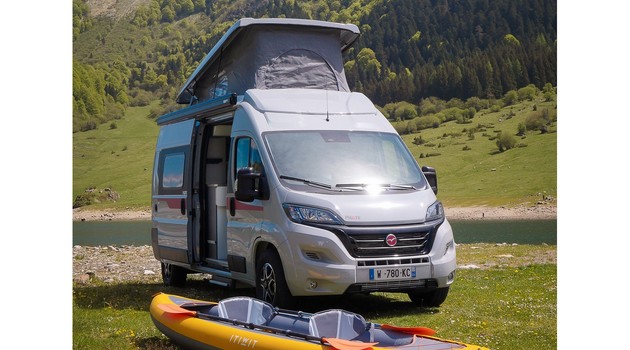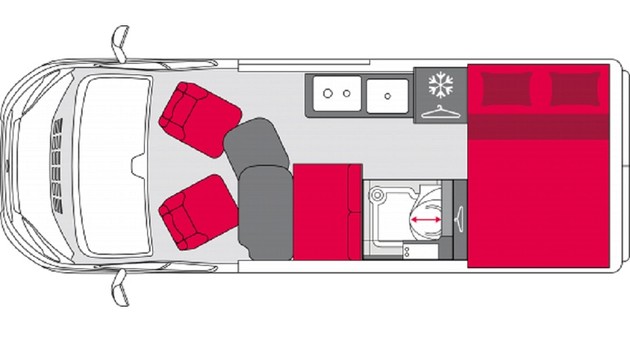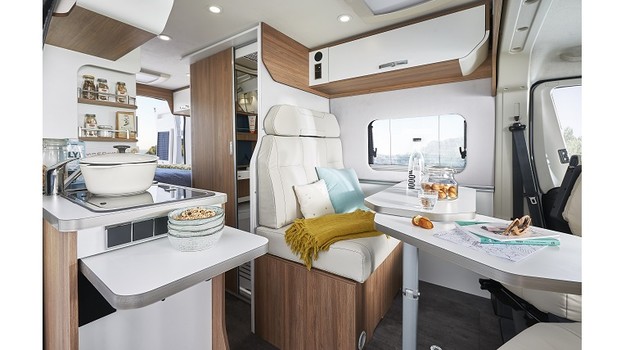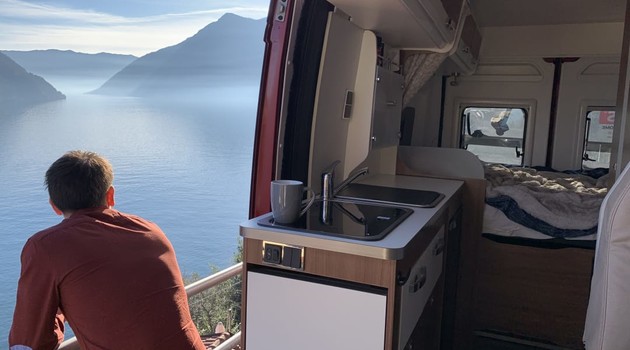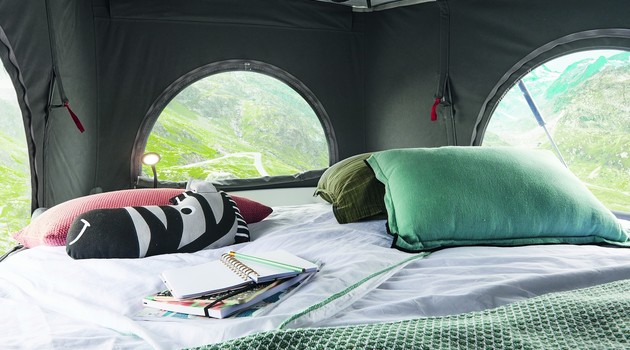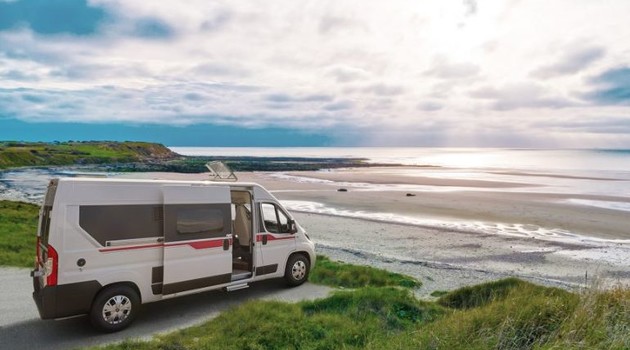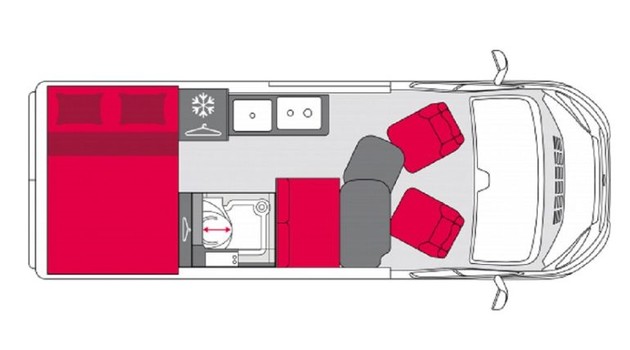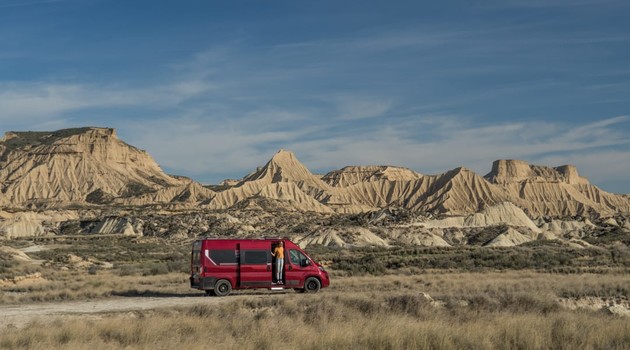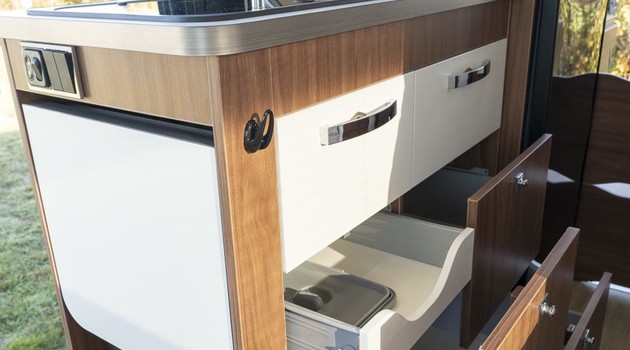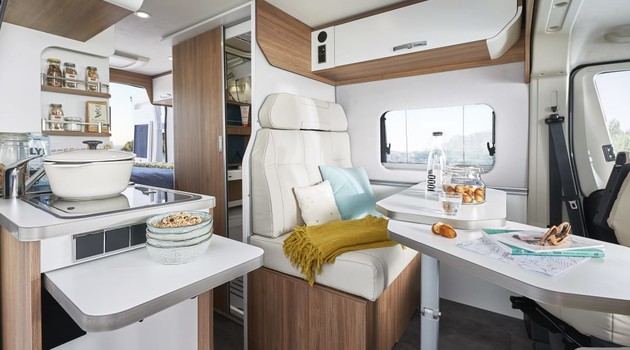Between spots in the wild, dedicated areas, campsites, or staying with locals, travelers have multiple options, each with its own advantages and constraints. This comprehensive guide will help you identify the best places to spend the night while providing practical advice and tools to plan your route with peace of mind and avoid unpleasant surprises.
The different options for sleeping in a van
When traveling in a converted van, several possibilities are available for spending the night in complete peace. Each option has its benefits and constraints, depending on the need for comfort, security, and autonomy. Here’s an overview of the main solutions.
Sleeping in the wild : The appeal of wild camping
Wild camping is the preferred option for lovers of vast spaces and adventure. Waking up facing the sea, in the heart of a forest, or high in the mountains offers a unique and immersive experience.
- Advantages: Total freedom, exceptional natural setting, often free.
- Disadvantages: Strict regulations, the need to respect the environment, sometimes limited access.
Regulations to Know !
In France, wild camping is tolerated under certain conditions but is prohibited in national parks, nature reserves, and on beaches. It is recommended to check with local town halls and to adopt responsible behavior (leave no trace, avoid disturbances).
Service areas and parking lots dedicated to vans
Motorhome areas and spaces dedicated to converted vans are an ideal alternative for combining practicality with minimal comfort. These areas, located on the outskirts of cities or in natural settings, generally provide facilities such as water, electricity, and waste disposal points.
- Advantages: Security, accessible services, often inexpensive.
- Disadvantages: Limited spots in high season, less privacy.
To Try ! Some apps like Campercontact, Caramaps, or Park4Night allow you to locate these areas easily and read reviews from other travelers.
Campsites for the comfort and services
For travelers looking for a minimum level of comfort, campsites remain a safe bet. They offer facilities adapted to converted vans, such as restrooms, electrical hookups, showers, and sometimes even dining areas.
- Advantages: Secure, fully equipped, ideal for long stays.
- Disadvantages: Higher cost, sometimes requires a reservation, less "nature" ambiance.
Good to Know ! Some campsites offer specific packages for vans with advantageous rates for a single night.
Urban parking : sleeping in a van in the city
Finding a place to sleep in a van in a city can be a challenge. Some public parking lots or residential areas allow vans to park overnight, provided local regulations are respected.
- Advantages: Convenient for visiting a city, often free.
- Disadvantages: Noise, traffic, municipal restrictions.
Tip ! Large supermarket parking lots, some industrial areas, or park-and-ride lots can be good options for a transit night.
France passion and staying with locals
For a more authentic and friendly experience, networks like France Passion or HomeCamper allow vanlifers to park on private land (farms, vineyards, gardens) in exchange for a small fee or for free.
- Advantages: Enriching encounters, local immersion, secure setting.
- Disadvantages: Requires a reservation or membership, variable availability.
Great Deal ! France Passion provides access to over 2,000 spots with local producers for an affordable annual membership.
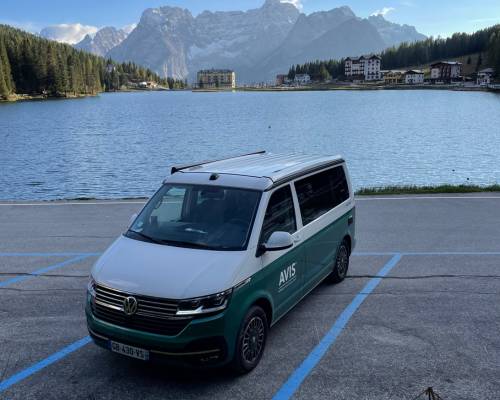
How to choose the right spot for the night
Finding the ideal place to spend the night in a van is not just about spotting a free space. Safety, comfort, and regulations are crucial factors to consider to avoid unpleasant surprises. Here are the essential elements to check before settling in for the night.
Security and tranquility : The essential criteria
Before parking for the night, it’s important to check several key factors:
- Distance from busy roads to avoid noise disturbances and heavy traffic.
- Moderate lighting: A spot that is too dark can be unsettling, but excessive light can disrupt sleep.
- Presence of other vans or motorhomes, a good indicator of the site's reliability and safety.
- Assessment of natural risks: Avoid flood-prone areas, unstable terrain, or overly exposed windy spots.
Tip ! A quick search for reviews on forums, Facebook groups for vanlifers, or dedicated apps can help evaluate the reliability of a spot.
Checking local regulations
The parking of converted vans is subject to varying regulations depending on the municipality. It is essential to check in advance to avoid fines or penalties.
Difference between parking and camping
- Parking : A converted van can park like a regular vehicle in an authorized parking space as long as no exterior equipment is deployed (awning, table, chairs, leveling blocks).
- Camping : As soon as a vehicle sets up an area with outdoor equipment, it is considered camping and may be prohibited outside designated areas.
Type of local restrictions in France
- Protected coastal areas : Many coastal municipalities prohibit overnight parking for motorhomes and vans. In Brittany, municipal decrees restrict parking along the coast (e.g., Ploumanac’h, Crozon).
- Tourist cities : Some highly visited cities impose strict rules. In Biarritz, van parking is prohibited between 11 PM and 7 AM in several municipal lots.
- Mountain regions : In some areas of the Alps or Pyrenees, wild camping is strictly forbidden, especially in Écrins National Park.
How do you stay up to date ?
- Municipal websites and local decrees often have updated rules about parking and camping.
- Road signs at town entrances may indicate specific restrictions for converted vehicles.
- Forums and apps (such as iOverlander, Caramaps) list local regulations based on traveler feedback.
Potential fines for non-compliance
- Illegal parking in a regulated area: €35 to €135 fine, depending on the municipal decree.
- Illegal wild camping (e.g., in natural parks): Fine of up to €1,500 in case of repeat offenses.
- Extended illegal parking (more than 7 consecutive days in the same spot): Risk of towing in certain municipalities.
Useful Tool ! The website geoportail.gouv.fr provides maps of national parks and protected areas where wild camping is prohibited.
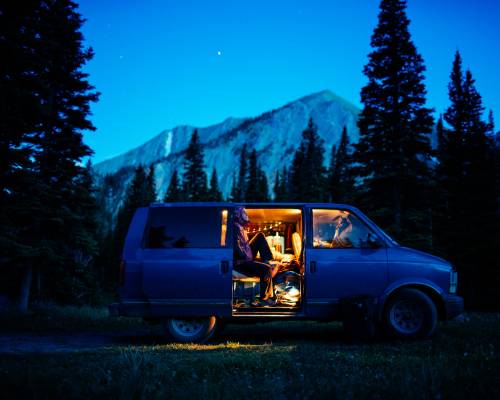
Apps and practical tools for finding a place to sleep in a van
When traveling in a converted van, having the right tools to locate safe and suitable spots is essential. Thanks to the many available apps and platforms, it is now easier than ever to find parking areas, campsites, or nature spots while avoiding unpleasant surprises. Here is a selection of the best solutions for efficiently organizing your nights on the road.
1. Specialized apps for finding a night spot
Mobile apps designed for van travelers help quickly find places to sleep, with reviews from other vanlifers and details on available services.
- Park4Night : The most well-known app among vanlifers. It lists campsites, service areas, free parking lots, and nature spots. Users share photos, reviews, and advice, making it easy to assess the reliability of a site.
Ideal for : Quickly finding a spot and reading other travelers' experiences. - Campercontact : Widely used in Europe, it mainly references official service areas and campsites suitable for converted vehicles. The premium option allows access to offline maps.
Ideal for : Locating regulated and secure areas. -
Caramaps : A comprehensive app that combines free areas, paid parking, nature spots, and homestays. It also offers van-friendly itineraries.
Ideal for :Travelers who want to vary their accommodation options. - iOverlander : Popular among vanlifers on long road trips, this app lists bivouac spots and service areas worldwide. It is especially useful for travels outside of Europe.
Ideal for : Travelers looking to explore lesser-known destinations.
2. Online maps and platforms for planning your route
In addition to mobile apps, some online tools allow for mapping out an itinerary and easily spotting places to sleep in a van.
- Géoportail (geoportail.gouv.fr) : The official website of the French government, which helps visualize protected areas where wild camping is prohibited (national parks, nature reserves).
Usage : Ideal for checking local regulations before settling in. - Google Maps & Street View: A must-have for assessing the real environment of a spot before going there.
Usage : Helps evaluate accessibility and safety (narrow roads, proximity to houses, lighting levels). - France Passion : This network offers vanlifers free parking spots at local producers’ sites (winemakers, farmers, market gardeners). The annual membership provides access to over 2,000 locations across France.
Ideal for : Experiencing an authentic and local stay in complete safety. - HomeCamper : An alternative to wild camping that allows travelers to find private land to stay on for a small financial contribution.
Ideal for : Those looking for a more secure and equipped setting.
3. Tools for anticipating weather conditions and road accessibility
To avoid unpleasant surprises, a few complementary tools can be useful when planning nights in a van.
- Météo France : Checking the weather before parking in the wild helps avoid risky areas in case of strong winds, rain, or snow.
Usage : Anticipate storms and precipitation to avoid muddy or flood-prone terrains. - Waze & ViaMichelin: These GPS apps help verify road accessibility and any restrictions for converted vehicles.
Usage :Avoid narrow roads, areas restricted to motorhomes, and identify high-traffic zones.
With these tools and apps, finding an ideal spot to sleep in a van becomes effortless. Whether in the wild, at a designated area, or with locals, each traveler can choose the option that best fits their preferences and itinerary.
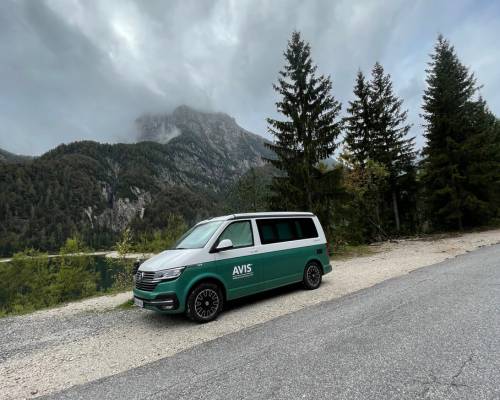
Tips and best practices for a peaceful night in a van
Sleeping in a converted van offers unparalleled freedom, but to fully enjoy the experience, a few precautions are necessary. Security, comfort, discretion, and environmental respect are the keys to a successful night. Here are the best practices to adopt to ensure a peaceful night, wherever you are.
Adopt discreet and respectful parking habits
- Avoid disturbances : Park in a quiet area, away from busy zones, and keep noise levels low to avoid disturbing residents or other travelers.
- Keep a low profile : Do not set up tables, chairs, leveling blocks, or an awning in public parking lots to avoid being perceived as engaging in illegal wild camping.
Respect nature : Always leave the place clean, pick up your trash, and avoid disturbing local wildlife.
Tip ! Bring a small broom and trash bags to always leave the spot spotless when leaving.
Security and risks prevention to avoiding unpleasant surprises
- Always lock your vehicle : Even for short absences, close doors and windows to prevent any intrusions.
- Choose a frequented spot : Prefer locations where other vans or motorhomes are present, as this deters potential theft.
- Trust your instincts : If a place feels too isolated or unsafe, it’s better to find another spot.
- Keep your phone charged : Have an external battery in case of emergency.
Good to know ! There are additional security systems for vans, such as reinforced locks, alarms, or onboard cameras.
Managing water, electricity, and waste autonomy
- Refill your water tank: Use service area stations or ask at campsites or local businesses.
- Conserve electricity: Charge devices while driving and use an auxiliary battery for lights and electronics.
- Dispose of waste properly: Throw trash in designated bins and empty wastewater only at appropriate stations.
Tip ! Carry a collapsible water container for drinking water storage and a portable solar panel for charging small devices.
Finding a good balance between comfort and flexibility
- Prepare a comfortable bed : A quality mattress and a good blanket are essential, especially in winter.
- Adapt to weather conditions : In summer, park in the shade; in winter, ensure proper insulation.
- Have an emergency kit : Include first aid items, a flashlight, a lighter, and basic tools to handle unexpected situations.
Good to know ! To prevent moisture inside the van, ventilate for a few minutes before sleeping and use moisture absorbers if necessary.
Far from being a constraint, these precautions allow you to fully enjoy the vanlife experience, avoiding inconveniences and maximizing travel pleasure. Van travel is also about adapting to situations and making the most of each discovery. With these tips, all that’s left to do is hit the road and embrace the adventure !
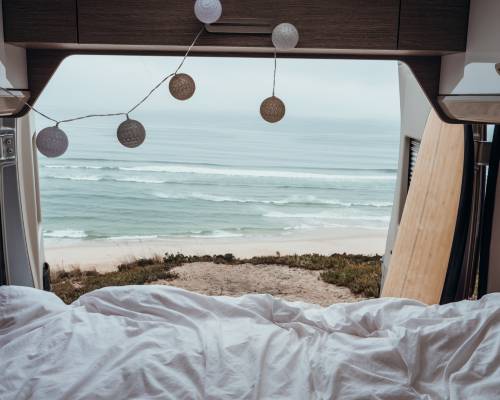
FAQ
Can you sleep anywhere in a campervan ?
No, parking a converted van is subject to specific regulations. Generally, it is allowed in public parking areas as long as no outdoor equipment (such as a table, chairs, or an awning) is set up. However, some municipalities impose restrictions, particularly in tourist areas or along the coast. It is always recommended to check road signs and local municipal regulations before settling in for the night to avoid any issues.
What are the rules for wild camping in France ?
Wild camping is strictly prohibited in national parks, nature reserves, and near classified sites. Outside of these areas, it may be tolerated under certain conditions. Travelers must obtain permission from the landowner, stay for no longer than 24 hours in the same spot, and ensure they do not disturb the environment. Because regulations can vary from one municipality to another, checking with local authorities before setting up camp is always advisable.
How can you find the best spots to sleep in a van ?
There are several ways to locate a good place to sleep in a van. Many travelers rely on specialized apps such as Park4Night, Caramaps, and Campercontact, which provide user reviews and detailed information on available services. Checking official maps on Géoportail is also useful to avoid restricted areas, such as national parks where camping is forbidden. Additionally, it can be helpful to seek advice from tourist offices and fellow vanlifers through forums and social media groups dedicated to van travel.
What are the risks of sleeping in the wild with a van ?
Sleeping in the wild offers a unique and immersive experience, but it comes with certain risks. One of the main concerns is isolation, as mechanical issues or safety concerns could arise in remote areas. Weather conditions should also be considered, as strong winds or heavy rainfall could make some locations unsafe. Furthermore, local regulations may prohibit overnight parking or wild camping, leading to potential fines. To minimize risks, it is best to park in areas where other vans or motorhomes are already present and to always have an alternative spot in mind in case relocation becomes necessary.
Can you be fined for sleeping in a van ?
Yes, fines can be issued if local parking or camping regulations are not respected. For illegal parking in a restricted area, fines typically range between €35 and €135, depending on the municipal decree. In cases of illegal wild camping, particularly in protected natural areas, fines can go up to €1,500 in the event of repeated offenses. Some cities and coastal areas impose strict overnight parking restrictions, so it is essential to check the local rules before settling in to avoid any penalties.
What are the alternatives to public parking for overnight stays ?
If public parking is not an option, several alternatives exist for spending the night in a van. Dedicated motorhome areas and campsites provide secure spots with amenities such as electricity, water, and waste disposal. Another option is France Passion, a network that allows vanlifers to stay for free at local farms and wineries, offering a more authentic and immersive experience. For those looking for a secure, private setting, HomeCamper provides access to privately owned land where van travelers can stay for a small fee. These alternatives provide a mix of security, comfort, and unique travel experiences.
Discover our other van life tips
Always eager to accompany you in the organisation of your next van road trip, AVIS explore wants to share with you all the tips and answer your questions to live your best van life with an AVIS explore rental van. Discover our selection of van life tips just for you !
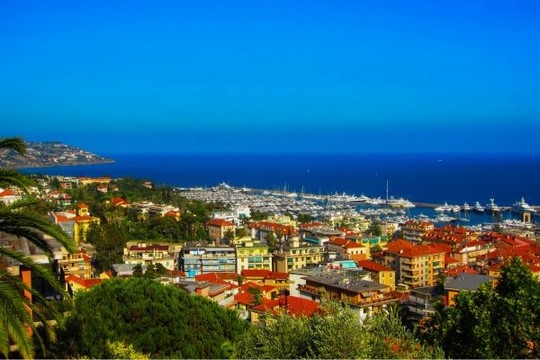
Discovering Italy in a converted van
Embark on an unforgettable adventure across Italy in a converted van, while enjoying the freedom and comfort that only a van road trip can offer.
Read more

Van road trip in Ireland, discover a magical Island
A land of legends, Ireland is a must-visit destination for van travel enthusiasts. Between its wild landscapes and scenic roads, the island offers a unique experience of freedom and adventure. From the Cliffs of Moher to the lush valleys of Connemara, every stop unveils a breathtaking new panorama. Traveling by van also means enjoying complete autonomy, stopping wherever you please, and spending the night in unforgettable places. With its well-maintained roads and welcoming locals, Ireland is the ideal choice for travelers seeking a change of scenery without sacrificing comfort. Embark on a van road trip through Ireland and let yourself be charmed by the island's rich cultural and natural diversity.
DISCOVER
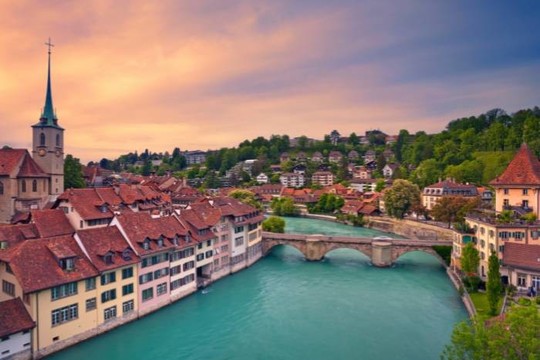
Experience an unforgettable road trip in a camper van across Switzerland
Traveling through Switzerland by van promises a unique adventure where freedom and discovery blend seamlessly. Picture yourself driving along scenic routes bordered by majestic mountains, crystal-clear lakes, and charming picturesque villages. Thanks to the flexibility offered by a camper van, every day becomes a new opportunity to uncover the hidden treasures of this enchanting country. Whether you’re a nature enthusiast who loves hiking or someone passionate about cultural discoveries, a van road trip in Switzerland is the perfect way to enjoy an authentic and immersive experience.
DISCOVER
Find out more about our vehicles
